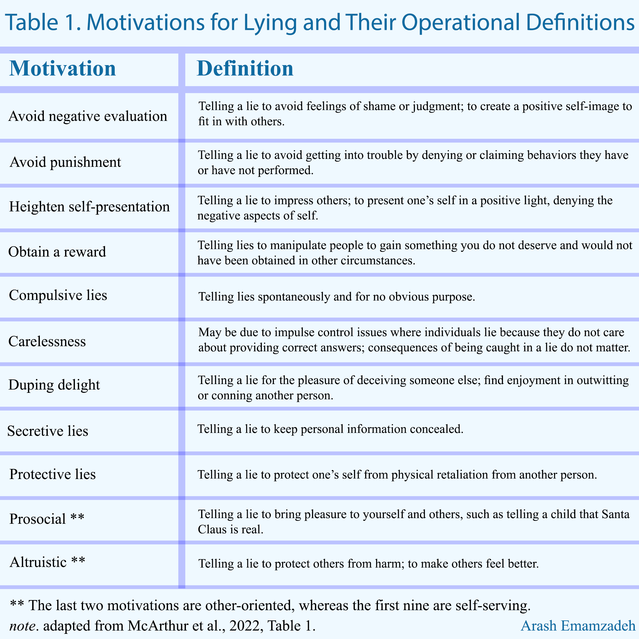Deception
Research Reveals the Most Common Reasons People Lie
The association between personality and motivations for lying is examined.
Posted December 21, 2022 Reviewed by Ekua Hagan
Key points
- People lie for a variety of reasons, such as to avoid receiving punishment, obtain rewards, or keep personal information secret.
- New research indicates the most common reasons for lying are altruistic (i.e., to protect others from harm).
- Research shows personality is associated with lying motivations (e.g., openness positively relates to "other-centered" reasons for lying).

Misleading advertisements by car dealerships, snake oil “medical” treatments, and cheating and infidelity in marital relationships are just a few examples of deception. A common form of deception is lying, which refers to making a false statement deliberately and with the intent to mislead the listener.
Research suggests detecting lies is very difficult. In fact, our ability to detect falsehoods is only slightly better than chance—though effective lie detection techniques (e.g., the cognitive approach to lie detection) can improve accuracy somewhat.
How big a problem is our inability to detect lies and deception? Well, that depends on how often people lie for malicious reasons. This is important because not all lies are bad, immoral, or criminal. In fact, sometimes people lie for benevolent reasons.
A recent paper, by McArthur et al., discusses the most common motivations for lying and examines the link between different motivations for lying and personality traits (e.g., extraversion, emotionality). This research, published in the October issue of Canadian Journal of Behavioural Science, is reviewed below.
Motivations for lying
People lie for a variety of reasons. These can be divided into 11 motives. They lie...
- To avoid being judged or feel shame.
- With the aim of avoiding punishment.
- To protect themselves from retaliation.
- For no “good reason” (e.g., compulsive lying).
- To present themselves in a positive way and impress others.
- To obtain rewards.
- Due to carelessness and impulsiveness.
- To experience pleasure from deceiving others.
- With the aim of keeping personal information secret.
- For prosocial reasons—to make others (and oneself) happy, such as telling children that Santa Claus is real.
- For altruistic reasons—to protect others from harm.
Note, the first nine motivations are self-serving; the last two, other-oriented.
More details on lying motivations are provided in Table 1, toward the end of the post.
But which of these 11 reasons is most common? Let us look at the research.
Investigating why people lie
Sample: 257 (103 women); average age of 40 years old (range of 18-73 years); 82% White; 89% with some college education; 67% employed full-time.
Measures:
- Lying Behavior and Motivations. Presented with 11 lying motivations (described above), participants were asked if they had lied for these particular reasons and how often.
- Personality. The HEXACO Personality Inventory-Revised was used to assess agreeableness, conscientiousness, emotionality, extraversion, honesty-humility, and openness to experience.
Results
About one-third of participants told three to seven lies a week. The majority, however, claimed to tell two or fewer lies a week.
Regarding lies told in the past six months, most reported lying for altruistic (64%) or secretive (60%) reasons. About half lied to avoid being negatively evaluated, 43% for prosocial reasons, and 40% to avoid being punished.
A smaller portion claimed that they lied to present themselves in a positive light (37%), due to impulsiveness and carelessness (21%), to gain a reward (21%), to protect themselves (22%), for no good reason and out of compulsion (11%), and because they enjoyed conning people (9%).
In terms of the association between HEXACO personality facets and lying motivations, the following was found:
Honesty-humility had an inverse correlation with lying frequency and the majority of lying motivations, suggesting that people high on this trait are less likely to engage in manipulation and exploitation.
Individuals high in emotionality (i.e., higher anxiety and emotional sensitivity) lied to avoid situations that were unpleasant and awkward. But they also lied for altruistic reasons, which may be explained by their higher levels of empathy.
Extraversion predicted self-centered reasons for lying (i.e., avoiding punishment, compulsive lying). In addition, extroverted people were less likely to lie for the purpose of keeping personal information secret. Why? Perhaps because extroverts are sociable and self-confident, and hence, feel less of a need to hide aspects of who they are.
High agreeableness was associated with a lower tendency to lie to avoid punishment or shame, to impress others, or for reasons related to compulsive lying, suggesting that agreeable individuals are less prone to dishonesty for “self-gain.”
Conscientiousness correlated with lower lying frequency and negatively predicted lying for self-serving reasons. In contrast, those lower on conscientiousness were more likely to engage in compulsive lying (i.e., lying for no good reason) and to enjoy conning and outwitting others.
Lastly, there was a positive relationship between openness and engaging in “other-centered deceptive behavior for prosocial reasons.”

Takeaway
The research above concluded that the most common motivations for lying are:
- Altruistic reasons
- Keeping personal information secret
- Avoidance of being judged
Indeed, it concluded, people most often lie for altruistic reasons (e.g., to protect others from harm).
So, as far as motivation is concerned, lying and deception are not always malicious, immoral, or unethical.
A second finding was that knowledge of personality traits may help us predict lying and deceptive behavior.
For instance, those low on conscientiousness and high on impulsiveness tend to lie more frequently and for self-centered reasons. This is not surprising. After all, in order to be honest, awareness of ethical norms is not sufficient; one must also have high self-control.




